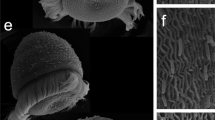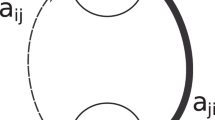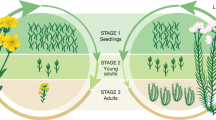Abstract
THE Volterra–Gause equations1—the mathematical formulation of the principle of competitive exclusion2—are  where r1 is the intrinsic rate of increase of species 1, N1 is its population size, and K1 is the expected value of N1 in single species culture. The constants α and β, the coefficients of competition, denote the relative effect of the abundance of one species on the population growth rate of the other. These relationships imply that for a stable competitive equilibrium to obtain it is necessary that
where r1 is the intrinsic rate of increase of species 1, N1 is its population size, and K1 is the expected value of N1 in single species culture. The constants α and β, the coefficients of competition, denote the relative effect of the abundance of one species on the population growth rate of the other. These relationships imply that for a stable competitive equilibrium to obtain it is necessary that 
This is a preview of subscription content, access via your institution
Access options
Subscribe to this journal
Receive 51 print issues and online access
$199.00 per year
only $3.90 per issue
Buy this article
- Purchase on Springer Link
- Instant access to full article PDF
Prices may be subject to local taxes which are calculated during checkout
Similar content being viewed by others
References
Gause, G. F., The Struggle for Existence (Williams and Wilkins. Baltimore, 1934).
Hardin, G., Science, 131, 1292 (1960).
Ayala, F. J., Nature, 224, 1076 (1969).
Author information
Authors and Affiliations
Rights and permissions
About this article
Cite this article
BOROWSKY, R. Principle of Competitive Exclusion and Drosophila. Nature 230, 409–410 (1971). https://doi.org/10.1038/230409a0
Received:
Revised:
Issue Date:
DOI: https://doi.org/10.1038/230409a0
This article is cited by
Comments
By submitting a comment you agree to abide by our Terms and Community Guidelines. If you find something abusive or that does not comply with our terms or guidelines please flag it as inappropriate.



